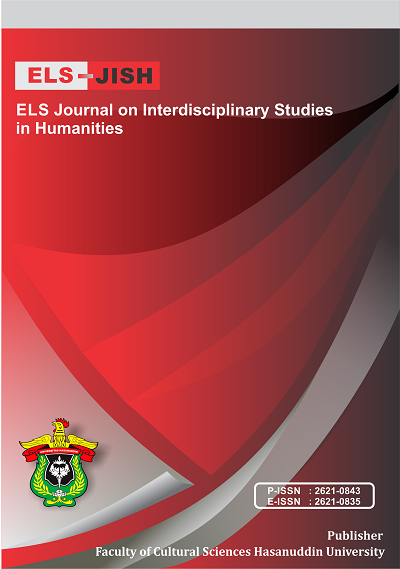Analyzing Pre-Service English Teachers' Digital Literacy Skills in EFL Teaching
DOI:
https://doi.org/10.34050/elsjish.v6i3.27627Keywords:
Digital Literacy, Pre-Service Teacher, TEFLAbstract
This study analyses the types of digital literacy skills frequently used and how digital literacy skills support pre-service English teachers’ performances. This research used a mixed method with an explanatory sequential design. The data collection method begins with the collection of quantitative data by online questionnaire, then proceed with the collection of qualitative data to help analyze the data obtained quantitatively through observation and interview. The population of this study was pre-service English teachers, the sixth-semester students of the English Education program at Universitas Negeri Makassar who program teaching training including PPL, Kampus Mengajar, and Ajarmi program. One hundred and two pre-service English teachers filled out the questionnaire, while several representatives were chosen for interview. The result showed that (1) various digital literacy skills were used by pre-service English teachers, such as information, technology, media, communication, reproduction, branching, socio-emotional, and real-time thinking skills. However, the use of information literacy has the highest used percentage, which is 54 % in Often category and 0 % in Never category. and (2) pre-service English teachers' use of digital literacy skills supported the teaching performances, including the access to prepare teaching models and media, improving their teaching skills, and producing new creative and innovative teaching content.
References
Asfihana, R., Salija, K., Iskandar, I., & Garim, I. (2022). Students’ English Learning Experiences on Virtual Project-Based Learning Instruction. International Journal of Language Education, 6(2), 196. https://doi.org/10.26858/ijole.v6i2.20506
Bawden, D. (2008). Digital literacies: Concepts, policies and practices (M. Knobel & C. Lankshear, Eds.). New York: Peter Lang.
Beardsley, M., Albó, L., Aragón, P., & Hernández‐Leo, D. (2021). Emergency education effects on teacher abilities and motivation to use digital technologies. British Journal of Educational Technology, 52(4), 1455–1477. https://doi.org/10.1111/bjet.13101
Creswell, J. W. (2014). Research design: Qualitative, quantitative, and mixed methods approaches (4th ed). Thousand Oaks: SAGE Publications.
Eshet-Alkalai, Y. (2012). Thinking in the Digital Era: A Revised Model for Digital Literacy. Issues in Informing Science and Information Technology, 9, 267–276. https://doi.org/10.28945/1621
Gilster, P. (1997). Digital literacy. New York: Wiley Computer Pub.
Jones-Jang, S. M., Mortensen, T., & Liu, J. (2021). Does Media Literacy Help Identification of Fake News? Information Literacy Helps, but Other Literacies Don’t. American Behavioral Scientist, 65(2), 371–388. https://doi.org/10.1177/0002764219869406
Josie, J., Wenwei, L., & Fang, C. (2018). Bridging the digital divide: Measuring digital literacy. Economics, 12(1), 20180023. https://doi.org/10.5018/economics-ejournal.ja.2018-23
Krrabaj, S., Baxhaku, F., & Sadrijaj, D. (2017). Investigating search engine optimization techniques for effective ranking: A case study of an educational site. 2017 6th Mediterranean Conference on Embedded Computing (MECO), 1–4. Bar, Montenegro: IEEE. https://doi.org/10.1109/MECO.2017.7977137
Labbo, L., Reinking, D., & McKenna, M. (1998). Technology and Literacy Education in the Next Century: Exploring the Connection Between Work and Schooling. Peabody Journal of Education, 73(3), 273–289. https://doi.org/10.1207/s15327930pje7303&4_13
Law, N. (2018). A Global Framework of Reference on Digital Literacy Skills for Indicator 4.4.2. Quebec: UNESCO.
Lestari, S., & Santoso, A. (2019). The Roles of Digital Literacy, Technology Literacy, and Human Literacy to Encourage Work Readiness of Accounting Education Students in the Fourth Industrial Revolution Era. KnE Social Sciences, 3(11), 513. https://doi.org/10.18502/kss.v3i11.4031
Li, G., Sun, Z., & Jee, Y. (2019). The more technology the better? A comparison of teacher-student interaction in high and low technology use elementary EFL classrooms in China. System, 84, 24–40. https://doi.org/10.1016/j.system.2019.05.003
Nabhan, S. (2021). Pre-Service Teachers’ Conceptions And Competences On Digital Literacy In An ELF Academic Writing Setting. Indonesian Journal of Applied Linguistics, 11(1). https://doi.org/10.17509/ijal.v11i1.34628
Peled, Y. (2021). Pre-service teacher’s self-perception of digital literacy: The case of Israel. Education and Information Technologies, 26(3), 2879–2896. https://doi.org/10.1007/s10639-020-10387-x
Rahman, F. (2018). The Constraints of Foreign Learners in Reading English Literary Works: A Case Study at Hasanuddin University. Journal of Arts and Humanities, 7(2), 01-12.
Rahman, F., & Weda, S. (2018). Students’ perceptions in appreciating English literary works through critical comment: A case study at Hasanuddin University and Universitas Negeri Makassar. Asian EFL Journal, 20(3), 149-172.
Sulaiman, J., & Ismail, S. N. (2020). Teacher Competence and 21st Century Skills in Transformation Schools 2025 (TS25). Universal Journal of Educational Research, 8(8), 3536–3544. https://doi.org/10.13189/ujer.2020.080829
Teo, T. (2009). Modelling technology acceptance in education: A study of pre-service teachers. Computers & Education, 52(2), 302–312. https://doi.org/10.1016/j.compedu.2008.08.006
Downloads
Published
How to Cite
Issue
Section
License
Copyright (c) 2023 Zahraini Fajri Nur, Sahril Nur, La Sunra

This work is licensed under a Creative Commons Attribution-ShareAlike 4.0 International License.






